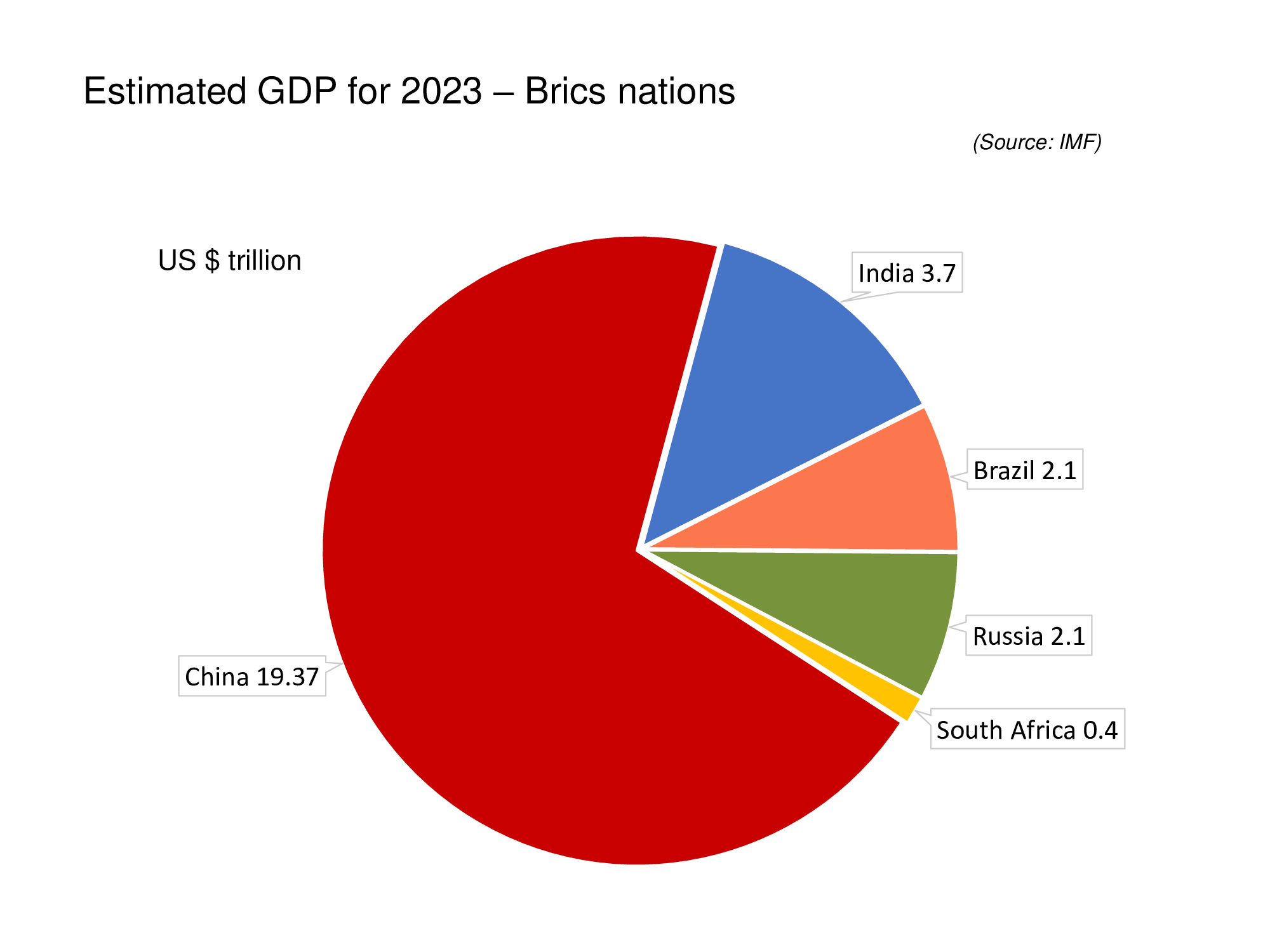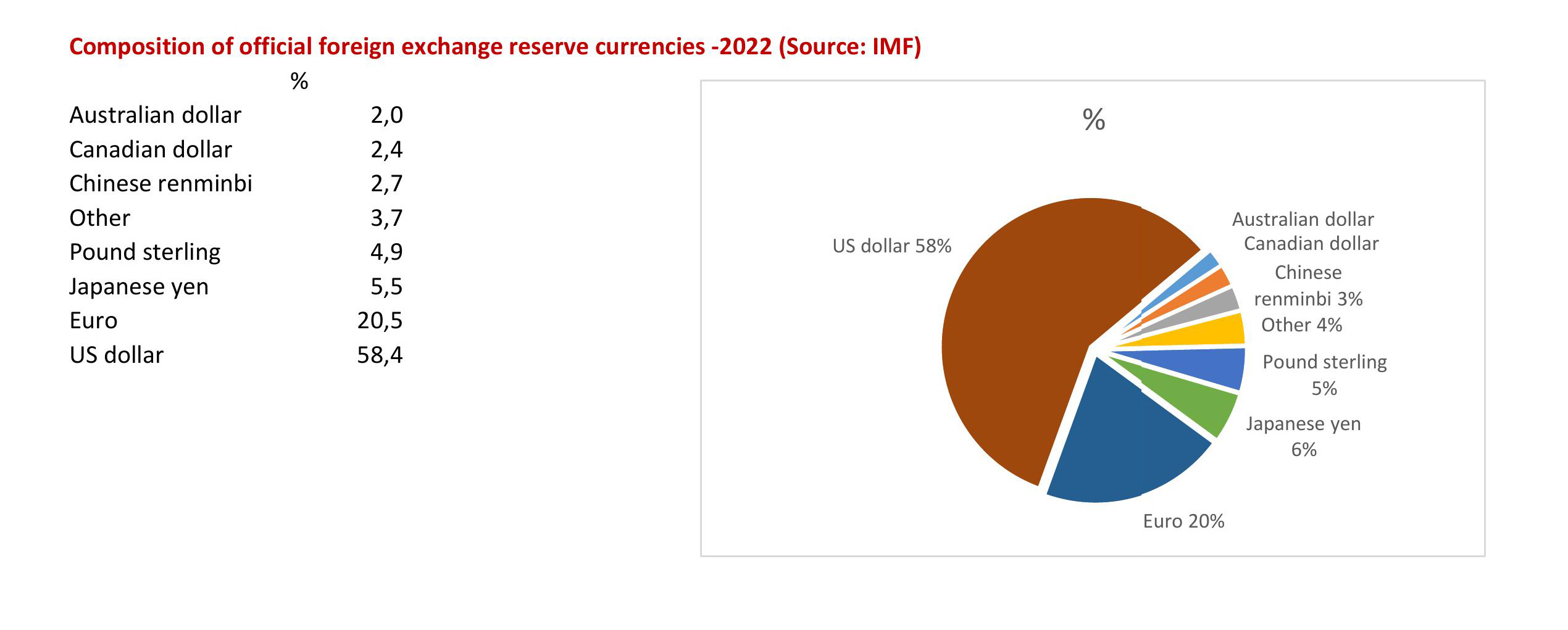Brazil, Russia, India, China and South Africa have been in the news lately, but for all the wrong reasons.
Apart from Russia’s war-mongering in Ukraine and China’s renewed hostility towards Taiwan, Brazil’s newly elected leader, Lula da Silva, has been spearheading plans to establish an alternative international trade and reserve currency to the US dollar.
These attempts surfaced at the first summit of the Bric countries in 2009 in Russia (one year before South Africa’s inclusion). They have become vogue again as China and Russia start to consolidate efforts to create a so-called new world order.
Fourteen years on and nothing much has changed in the realm of the dominant international financial status of the US dollar and the euro.
It seems clear that the heightened geopolitical tensions arising from Russia’s military invasion of Ukraine and China’s ambitions to expand its communist model of authoritarian government has renewed the appetite of BRICS and like-minded countries to challenge the US dollar and the euro.
This task seems futile when considering the long history behind the role played by Western currencies in trade and official foreign exchange reserves.
A member of the Russian parliament was recently quoted by Bloomberg as stating that the BRICS nations were in the process of creating a new medium for payments that deliberately replaces the equivalent demand for US dollars and euros.
Differences on policy issues
Here is the first snag in these over-ambitious plans, namely the huge differences in the economic prowess between the five countries. Differences will continue to abound on issues such as environmental protocols, intra-BRICS trade balances, trade policy (especially China’s habit of “dumping”), human rights, as well as lingering hostility between India and China.
Any meaningful undervaluation of individual BRICS currencies will also lead to tensions, as this will erode the competitiveness of the other currencies.
Differences of opinion may also arise with any future expansion of BRICS. Several of the countries that have indicated an interest in joining BRICS have serious problems in the areas of fiscal and monetary stability, and most of them have dubious rankings in the Fragile State Index.
South Africa’s membership of BRICS has puzzled political and economic researchers ever since disgraced former president Jacob Zuma accepted the invitation to join in 2010.
At the time, Bric was widely regarded as an anti-America club, although India has not been as fervent as the other three countries in criticising the Western world order (characterised by democracy and economic freedom).
When considering the relative sizes of the BRICS economies, it seems clear that South Africa is destined to merely toe the line, without any meaningful influence in key decisions – hence the embarrassing stance on Russia’s war on Ukraine.

Mountain to climb
The futility of the BRICS’ ambitions for a new international reserve currency is underscored by the composition of global foreign exchange reserves.
It seems as if China and Russia, who have been particularly vocal about their de facto opposition towards the values enshrined in the UN Charter on Human Rights, have missed an important point: they are not doing battle with the US alone, but with its allies as well.

South Africa’s association with the repressive regimes of China and Russia have been a source of both embarrassment and concern for many South Africans.
In March, the International Criminal Court issued a warrant of arrest for Russian President Vladimir Putin for the unlawful deportation of children.
Read more in Daily Maverick: Vladimir Putin in South Africa: A diplomatic and legal dilemma for the government
In August 2022, the United Nations reported that China’s government had committed abuses that may amount to crimes against humanity. This followed concrete evidence of mass arbitrary detention, torture, cultural persecution and forced labour of people in the Xinjiang region.
It is clear that the war in Ukraine has led to an escalation of a stark political dividing line between Russia (supported by China) and the West, which threatens to turn BRICS into an association not so much interested in economic development, but rather bent on spreading a dangerous system of authoritarian nationalism.
Viewed against the background of the strategically important trade and investment relationship between South Africa and its key trading partners in Europe and the US, it is in the economic interests of the country to reconsider its membership of BRICS and rather focus on strengthening the logistics infrastructure and trade relations in southern Africa. BM/DM


















 Become an Insider
Become an Insider
We do not need to be in BRICS, it is totally counterproductive and illogical. I bet that the anc are getting some sort of aid from those substandard BRIC countries.
The economic sense that this article expresses is starkly clear. However, there is something else that needs to be considered – that the real conflict between the autocratic and western powers are regarding the use of military powers; the economics are only used to enhance that conflict. And in that sense the first countries that blatantly violated the UN-based rules based international political system were not the countries now in BRICS, but western countries, and for much the same childish kind of reasons as what Russia is doing now – George Bush jnr’s USA government invading Iraq in 2003 in spite of the fact that Russia veto’d the approval of the campaign in the UN Security Council, and the European Union part of NATO that sent its’ troops into Libya in 2011 in violation of the UN resolution that only authorized a levelling of the playing field between the warring sides by neutralizing the airfields of the Libyan government. That was where the standing of the rules on which the international order is based started to deteriorate; in 2003 already; the Ukrainian war is just a continuation of it. So I propose that, to get the world back to a situation where certain rules exist that binds ALL countries and which is widely accepted by all of them, the UN and BRICS. under the leadership of the USA and China, start discussions about a new organisation to succeed the UN, which organisation will not have any veto’s any more and which will reconsider all the existiong “rules”.
. . . Maybe, in this new organisation, if too many conflicts of interest exist between the USA and China, a third organisation can also take part, say the organisation of non-aligned countries, because they have all the motivation to prevent one of the two powerful countries from dominating the decisions as is going on now. So the economics will probably a big, if soft, part, but the legal international system can be restored in this way. For instance it can work with the USA (or a coalition between the USA and Europe maybe), China and the Organisation of Non-Aligned Countries will each have on vote; in other words anything that two of the three agree on, is carried. Because the interests of these three groups differ radically enough for a serious balance to be guaranteed. The Organisation of Non-Aligned Countries tend to be quite divided, but exactly that will create a situation where none of the other two will be able to dominate; the ONAC shares one value and that is that they don’t want to be dominated by the superpowers. Such a new organisation can then co-exist with the UN, with the UN being used widely as an additional debating forum (all the countries are present), but where the new organisation then sets authoratative new rules for the international order. The new organisation can then supercede the role of the UN Security Council in the end, with the UN-SC simply becoming redundant because nobody will listen to it any more.
. . . Of course there will be risks in this move too, but fact is that the interests of the USA and the EU as well as that of China are being put at risk by the fact that none of the two sides are willing to be dominated by the other, and neither do they seem to be respecting the other side. The prospect of the non-aligned movement with its’ diversity and the positive, non-dominant influence that it can have may just be attractive to both China and the West in order to restore the order. And the non-aligned movement has sufficient diversity in it, including countries that are pro- as well as anti-USA and UN. I also anticipate that the development of this new organisation will take decades and can develop into many different forms; but at least a debate will then be conducted that are not obstructed by one country vetoing anything that is not in its’ own selfish interests. Fact is that Russia is basically a spent force, both in economic, military and diplomatic terms, and between the USA and China there should also be sufficient military technology to create the possibility of neutralizing Russias huge nuclear arsenal, to persuade Russia to start to give co-operation again. So this new organisation, contrary to the perception of the UN, will not be to promote democracy, but ONLY to create sufficient rules for a reasonable measure of international stability. The League of Nations ended with WW2; maybe we need to supercede the UN-SC with something else with the Ukraine war now.